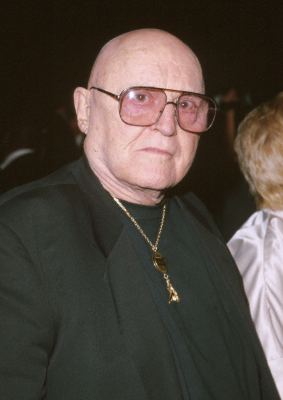Rod Steiger
ActorBiografía
Rodney Stephen Steiger was born in Westhampton, New York, to Augusta Amelia (Driver) and Frederick Jacob Steiger, both vaudevillians. He was of German and Austrian ancestry. After his parents’ divorce, Steiger was raised by his mother in Newark, New Jersey. He dropped out of Westside High school at age 16 and joined the Navy. He saw action in the Pacific on a destroyer. Steiger returned to New Jersey after the war and worked for the VA. He was part of an amateur acting group, and then joined the Actors’ Studio using his GI Bill benefits. Steiger received his first film roles in the early 1950s. His first major one was in Teresa (1951), but his first lead role was in the TV version of The Philco-Goodyear Television Playhouse: Marty (1953). The movie version, however, had Ernest Borgnine in the lead and won him an Academy Award. Steiger’s breakthrough role came in 1954, with the classic On the Waterfront (1954). Since then he has been a presence on the screen as everything from a popular leading man to a little-known character actor. Steiger made a name for himself in many different types of roles, from a crooked promoter in The Harder They Fall (1956) to the title character in Al Capone (1959). He was one of dozens of stars in the epic World War II film The Longest Day (1962). In 1964, he received his second Oscar nomination for The Pawnbroker (1964). The next couple of years he was at the height of his powers. In 1965, he starred in the dark comedy The Loved One (1965), and in David Lean’s epic Doctor Zhivago (1965). In 1966, he starred in the BBC Play of the Month (1965) episode “Death of a Salesman” as Willy Loman in the TV version of his stage play “Death of a Salesman,” but in 1967, he landed what many consider his greatest role: Sheriff Bill Gillespie in In the Heat of the Night (1967), opposite Sidney Poitier. Steiger deservedly took home the Best Actor Oscar for his work in that film. He took another controversial role as a man with many tattoos in The Illustrated Man (1969) and as a serial killer in the classic No Way to Treat a Lady (1968). After that, he seemed to have withdrawn from high-profile movies and became more selective in the roles he chose. He turned down the lead in Patton (1970) and also in The Godfather (1972). Among his more notable roles in the 1970s are Happy Birthday, Wanda June (1971), Lolly-Madonna XXX (1973), as Benito Mussolini in The Last 4 Days (1974), Portrait of a Hitman (1979), Jésus de Nazareth (1977), F.I.S.T. (1978) and The Amityville Horror (1979). He starred in the critically acclaimed The Chosen (1981) with Robby Benson and Maximilian Schell, perhaps the highlight of his 1980s movie career. Steiger increasingly moved away from the big Hollywood pictures, instead taking roles in foreign productions and independent movies. As the 1980s ended, Steiger landed a role as the buttoned-up New York City Chief of Police in The January Man (1989). Steiger was seriously affected by depression for 8 years. As he returned to the screen in the late 1990s he began creating some of his most memorable roles. He was the doctor in the independently-made movie Shiloh (1996), about an abused dog. He was the crazed, kill-’em-all army general in Mars Attacks! (1996) who always called his enemies peace-mongers. He took a small part as a Supreme Court judge in The Hurricane (1999) and as a preacher in the badly produced film End of Days (1999). He was still active in films moving into the new millennium.

